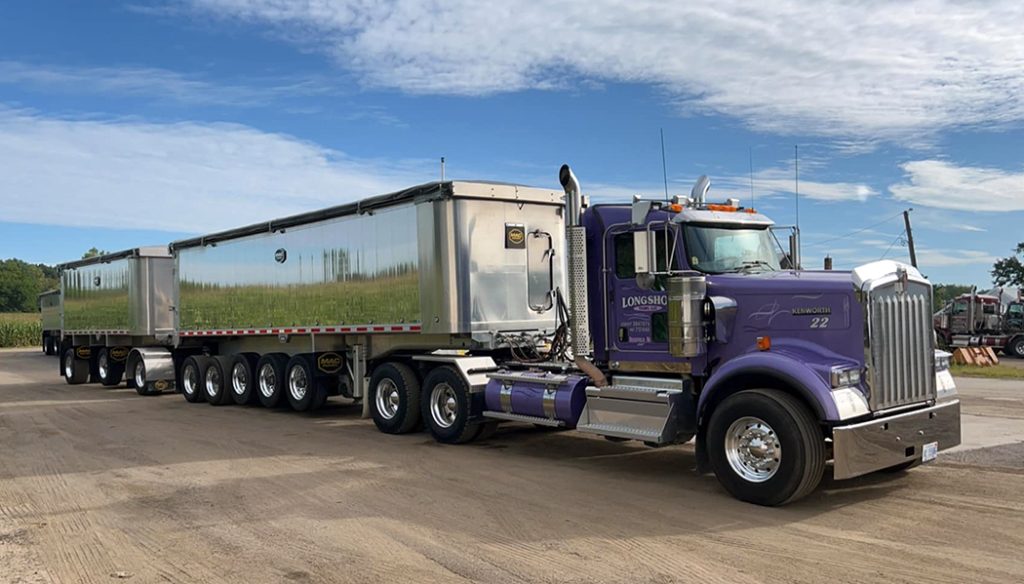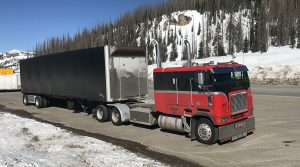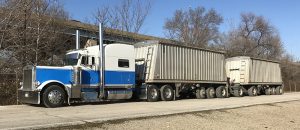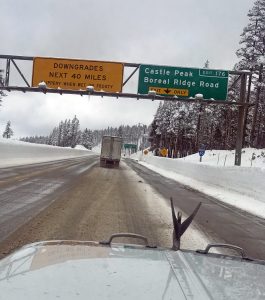
We all know the story of the little engine that could. For those of you who didn’t grow up with a parent that pushed you to excel or succeed regardless of your ability, here’s your sign! Summer is winding down and all those projects we planned to do but never did because it was too hot are still waiting. The kids or grandkids are back to school, so that can no longer be used as your excuse.
If you are like most of us, you are driving more miles these days just to keep the bills paid, so with what little free time you get, you don’t want to waste it on more work at home. News Flash! Some days it sucks to be you. You’re not alone – I have just as many “Honey Do” things on my list as the rest of you. But like it or not, they all have to get done. Some days I feel like that little train engine, pulling a heavy load, and it’s all uphill.
I’m sure some of you might be wondering why I’m writing about trains in a truck magazine. Well, for those readers, I will clarify – we can make it an Australian Road Train with multiple trailers or maybe a Michigan Gravel Train loaded to the brim with stones. Either way, every time you approach a long or steep grade, your mind wanders, and you question if your old workhorse is going to make it over the top. As you drop gears in the transmission and stand on the fuel, the first trailer whispers to you, “I’m loaded heavy and the road is long,” then the second trailer pipes in, “I too am loaded over the limit and this grade is steep and I’m getting weary.”
Drivers today face many obstacles while doing their routines. The general public is relying on them to keep society fed, clothed, fueled, and everything else. There are times when all of us feel a bit overwhelmed and under-appreciated. There are times when every one of us wants to throw our hands up and walk away. So, what keeps you going?
I received a request from one of our readers last week that was struggling with whether to stay trucking or move on to something different. His concern was how to make more money to cover his cost of operation, with the low freight rates and high cost of fuel today, and wanted to know my thoughts about the future of our industry. Those are serious problems that cannot be answered in a couple tweets or a short conversation. I quizzed him on his type of freight, then on the type or method of payment he accepts. Oftentimes, your rates can be altered, depending on who pays, how they pay, and when they pay.
Just because you operate the truck doesn’t guarantee it will be profitable. In this case, the young man owned the tractor, but was still dependent on the carrier for the trailer, insurance, freight distribution, and collections. He is paid a percentage of gross but doesn’t see the freight bills to know what rate is being billed or charged. My response was, “I don’t know enough to advise you what changes to make, but it is always helpful if you can cut your financial liabilities.” With the economy the way it is, there is a limit to how much your receivables can be increased, so start working on the other end of your checkbook.
One of the most basic principles of business is the concept of Do No Harm. In other words, don’t make the situation worse by giving bad advice or acting on it. A person can find truck stop lawyers and parking lot consultants in every Pilot or Flying Hook, but who is going to be held responsible if you act on their suggestion and then lose everything you have worked for? Work smarter, not harder! Jumping companies may not be your best choice, either, and trading one wagon for another probably will not improve your bottom line quickly enough to save you.
I was scrolling through Facebook today, and an older gentleman, whom I have known for well over 30 years, popped up with some advice pertinent to today’s drivers. Dave Sweetman’s podcast “Smart Truckin” talks about how so many carriers had duped good drivers into thinking they can make more money if they buy a truck – and not just any truck, but one from their company. All you have to do is sign on the line and we will do the rest. What they are really saying is, “We will rob, pillage, and plunder any and all of your financial abilities. Then, after you have spent your last dollar, we’re going take the truck back because, after all, it doesn’t really belong to you, as you are just renting it from us.” Then, they will offer you another opportunity to drive one of their company trucks, just like before. Wash, rinse, and repeat.
So, what should you do next? Double down on determination – look for the loads no one wants to do because of the difficulty factor. Then, set about finding a good way to conquer the task. Efficiency is achieved through repeatedly doing the same action over and over until it becomes second nature. I don’t recommend cheap freight, but if you can capitalize on volume, then it should be an option to find ways to save that can make your business more profitable.
If this were Las Vegas they would be charged with racketeering! If you are not sure what that means, here’s the definition, according to the internet. “Racketeering is a set of illegal activities aimed at commercial profit that may be disguised as legitimate business deals. Racketeering is defined by a coordinated effort by multiple people to repeatedly earn a profit. Typically, by extortion, fraud, bribery, violence, or other illegal means.” I’m not a tin foil hat wearing conspiracy theorist, but that is a pretty good description of some fly-by-night trucking companies and brokers.
Not everyone is meant to be in the position of ownership. What’s my number one rule? Just because you can doesn’t mean you should. I see far too many new drivers being pushed into a role as lease operator to companies that only want a market for their used trucks. If you are serious about running your own trucking company, then do it the right way. Invest yourself in the business world and learn some skills – driving is not enough to see you through.
Money and time management, along with a basic understanding of the supply chain, are basic components of business. That doesn’t mean you’re not in business. All of us are some place in the chain of command for the people we represent. As the driver behind the wheel, we have the most responsibility for the health of that organization. Every decision while performing the task of loading, unloading, and transporting is a visual representation of the front office. Owning or leasing a piece of equipment doesn’t mean you are in control.
While listening to Mr. Sweetman, I was reminded of so many people I know who continually jump from one bad decision to the next, each time walking away with less than they had the last time. Ownership is not the end all be all. If you’re going to do this, you might want to do like the young man who contacted me – he has reached out to folks outside his circle of friends for advice (people who have been down this road, survived the experience, and gained a bit of insight along the way). Note to self: even a bad experience can be a good lesson, as long as you remember it.
It’s much better to be proactive than reactive. Back in the day, people would say it’s better to close the gate before the horse gets out of the barn or you will spend all your time chasing the horse, not riding it. Small changes now may save your investment later. I think I can, I think I can… if only I believe in myself and use every asset available. We are back to the tools in your toolbox thing. Knowledge can be the difference between success and the loss of all your hard work. Today, if I were to give advice, it would be to trim your liabilities and lose the things that are not important to your current business.
Most of your routine expenses aren’t going to go away in this economy or get cheaper anytime soon. However, that boat or motorcycle are expenses you could do without. Do you really need a four-wheel drive dually pickup to show off to your friends? You probably don’t have time to use them anyway. This year may be the time to skip the family vacation and set that money aside for the possibility of a breakdown. I realize this is an unfortunate inconvenience to the family, but they will be the ones who benefit the most when you succeed. If and when we get over this downturn, our trains, the ones who persevere, will coast down the other side of the hill, being pushed by the very ones who said you can’t do this anymore.
Business is always an exercise in leadership, the ability to forge a path through uncertainty, and to show strength when weakness would be the easiest path. Leadership doesn’t have to be a plan for the multitudes – a party of one still has to have a plan for success and then follow through. “I think I can, therefore I must” is the fuel for your future. Lead through example, follow proven programs that route your successes, and limit your failures.
Who knows, in 40 years some new operator might call my young friend and ask his advice on what to do. My hope is he will not say, “Mr. Mitchell said this to me,” but rather he will say, “I too had difficulty when I started, but I listened to others who had gone down the same path. They encouraged me to fight on and to not stop chugging uphill until the last car crosses over the crest.” Then, and only then, can you let up. I think I can, I think I can, 10-4!





